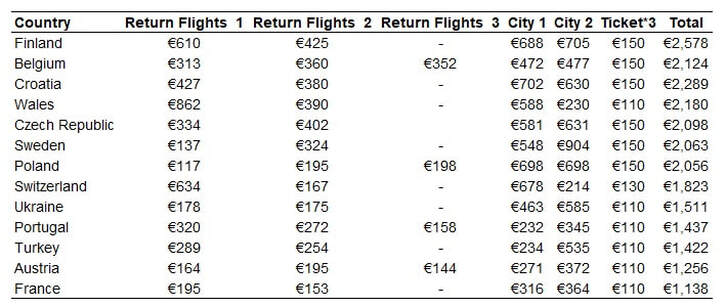Many models estimating spectator demand consider the role of travel costs as a determinant of stadium attendance. Unsurprisingly, distances between clubs are often found to be important to live attendance.
It’s interesting to consider travel costs given last weekend’s Euro 2020 draw. For those unfamiliar with the competition, Euro 2020 is different from its predecessors; there is no one/two host countries but rather the fixtures are scheduled in 12 cities across Europe. This is to commemorate the 60th anniversary of the tournament (although an alternative hypothesis is that hosts are becoming increasingly reluctant given the expansion of the tournament and associated higher costs).
Before fans would flock to, for example, France (2016), Poland/Ukraine (2012) or another host country. Now the costs are shared by hosts, an implication being that many fans have more complex travel arrangements, travelling to at least two host cities.
These host cities include eight national capitals. The fans from these countries will face much lower costs as now they don't have to travel for their group games. For example, the English, Spanish, Italians, Danes, Russians, Dutch and Germans will see their team play three home matches.
For fans from non-host countries, Euro 2020 is shaping up to be expensive and, for some, a logistical nightmare. Many fans now have to hike around Europe, as opposed to just one country. The table below offers some back-of-an-envelope cost estimates for travelling fans attending all three Euro 2020 group games.
The costs are based on the logic that fans will attend all three matches and come home in between fixtures, unless they have a consecutive match in the same city some days later, in which case they will purchase additional accommodation.
It’s assumed that fans travel the day before and leave the day after (if they don’t have another match in the coming days).
Round trip flight prices are estimated from Google Flights. It’s assumed fans are flying from the most populated city to the host city (one exception was Bilboa – Barcelona was used). The most efficient, lowest-priced, flight option was taken (non-stop).
The hotel prices (City 1 and City 2) are estimated from Booking.com where the cheapest option is selected. The accommodation criteria were a 3-star hotel, less than 1km from the city centre - hardly extravagant lodgings.
The match ticket prices are based on the UEFA ticketing system. In all cases, I chose the cheapest (category 3) entry fee's.
Save a thought for the Belgian, Polish, Austrian and Portuguese fans. They must travel to Copenhagen, Bucharest, Dublin and Budapest and return for to these locations for their final match having traveled elsewhere in the meantime.
The estimates also give some timely insights for the Irish. The Swedes will have to stay in Dublin for 7 nights. For this length of stay, Dublin comes in as the most expensive accommodation estimate. Also, the Poles travel here for a match on the 15th of June, thanks to Michael O’Leary they face the cheapest trip of all travelling fans – return flights from Warsaw to Dublin for €117.
On average, the Euro 2020’ group stages will likely cost a travelling fan about €1845 using the logic (of course, mainland Europeans may have plenty of other options outside of flying that may have lower costs and even cheaper accommodation could be sought).
Obviously, these are just the basic costs too – fans haven’t bought so much as a beer or bus ticket yet. Also, they don’t include any progression past the group stage. Costs will definitely increase for some.
So spare a thought for the travelling fans. This might be a lean Christmas. Then again, I’m sure the Irish would just love to have the problem of finding the money for a trip to Bilboa to face Spain next June.

 RSS Feed
RSS Feed